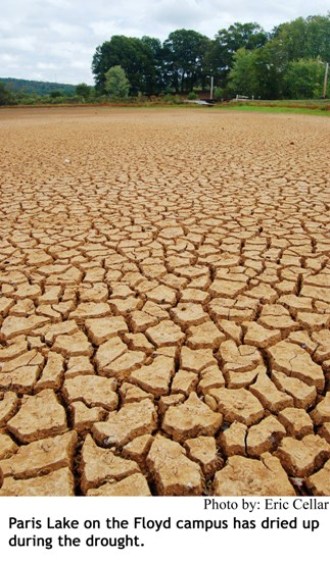NEWS |
|
Be sure to check out these other News articles:
Cartersville campus undergoes realistic terror drill
|
North Georgia drought causes controversyBy Amy Shafer
The state government is attempting to receive federal assistance by declaring Georgia in a state of emergency due to drought conditions. Gov. Sonny Perdue, in recent reports, has stated that Metro-Atlanta area's water supply has dwindled down to roughly an 80 or 90 day supply for the three million plus Atlanta residents. A drought occurs when there is an absence of precipitation over an extended period of time. Contrary to popular belief, a drought is not solely a natural event. Demands placed on the water supply by humanity exacerbate the effects of drought. There are ways of measuring drought conditions that are similar to the Richter and Fujita scales used to measure the devastation of earthquakes and tornados. The current conditions in the state of Georgia vary by location, but Floyd County is classified as D4, which is the most severe and indicates exceptional intensity on a broad scale of conditions. According to Greg Taylor, a soil scientist for Coosa Soil Services, Georgia has been in a D3 state (extreme drought condition) for the past five years, and the severity of the drought this year is a byproduct of our failure to conserve the water available to us. “One of the major negative effects of a drought of this magnitude is the lack of soil moisture,” said Taylor. “That soil moisture will have to be replenished before you will see any runoff refilling the lakes and rivers.” The lack of moisture in the soil has had a devastating affect on agriculture in the state. A second negative effect of the drought is the health hazards due to PCB waste in the water supply. According to Taylor, these PCBs, or Polychlorinated Biphenyls, have leaked into surrounding bodies of water. Since the PCBs are denser than the water, they sink to the bottom, which is currently the level at which we are forced to retrieve our water supply. This means that water filtration will be more costly. PCBs are linked to numerous health issues including cancerous and non-cancer effects on the endocrine, reproductive and immune systems. However, Joe Cook disagrees with Taylor stating, “I don’t think we are in as dire straights as government officials are leading us to believe.” He also went on record saying, “The crisis is not about the mussels, it’s not fair to pick on the mussels.” According to Cook, the water supply will last longer than the aforementioned 80 or 90 days and Floyd County is in even better condition. Cook agrees that the drought is not strictly natural and states that two other major effects on this area include a lack of conservation methods and poor management of the releases at Lake Lanier and Lake Allatoona. One of the major downfalls of the area was the killing of a bill that would have required all homes built in 1992 or before, to be retrofitted with more efficient plumbing systems. In older homes toilets that have not been retrofitted require 5-6 gallons per flush whereas newer systems can flush with one and a half or two gallons. According to Cook, Perdue is calling for a 10% decrease in water usage, state wide; the population should expect new watering restrictions. |
 Despite the light soaking parts of Northwest Georgia have received in recent weeks, our annual rainfall percentage is still 20" below average for this time of year, according to Joe Cook, the executive director of the Coosa River Basin Initiative.
Despite the light soaking parts of Northwest Georgia have received in recent weeks, our annual rainfall percentage is still 20" below average for this time of year, according to Joe Cook, the executive director of the Coosa River Basin Initiative.